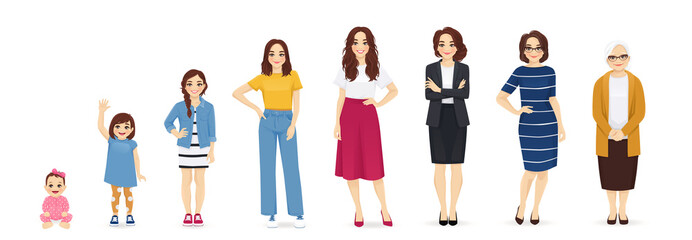Life’s Phases Introduction:-
Life’s Phases from the minute we are born until the day we leave this planet, we all embark on an amazing journey. It’s a journey with distinct phases, each with its own set of traits, problems, and possibilities. In this essay, we will go over the various stages of life in depth, using simple language to help us understand this complex journey.
(0-2 years):
Infancy is the initial stage of life, lasting from birth to roughly two years of age. During this time, we are completely reliant on our caregivers, who are usually our parents, for our fundamental requirements. Cries and simple motions teach us to eat, sleep, and communicate. During this stage, our major goal is to build trust in our caretakers and lay the groundwork for attachment and bonding.
Early Childhood (3-6 years):
Early childhood is a time of tremendous development and growth. This stage is distinguished by the emergence of linguistic skills, physical skills, and the initiation of social interactions. We begin to investigate our surroundings, develop a feeling of curiosity, and build fundamental bonds. Preschool or kindergarten is where we acquire fundamental skills and socialize with our peers.
Middle Childhood (7-12 years):
Middle childhood, sometimes known as the “tween” years, is a period of rapid cognitive and social growth. In elementary school, we begin formal education, where we learn fundamental knowledge and abilities. Our friendships get more complicated, and we begin to form a sense of ourselves. We may also pursue interests and talents through hobbies and activities.
Adolescence (13-18 years):
Adolescence is a transitional period characterized by physical, emotional, and psychological changes. Puberty occurs in our bodies, resulting in sexual maturation and the development of secondary sexual characteristics. We may feel mood swings and a need for independence emotionally. Identity discovery is also a feature of this stage, as we try to figure out who we are and what our values and beliefs are. High school is a key element of this stage because it is when we prepare for life and make important educational and career.
Early Adulthood (19-40 years):
Early adulthood is a time for exploration and freedom. Many people pursue higher education, begin careers, and create close relationships. During this stage, marriage and parenting are frequently key life events. We are faced with a plethora of options and challenges in the areas of job, relationships, and personal identity. It is a moment for self-discovery and laying the groundwork for the future.
Middle Adulthood (41-65 years):
Middle age is frequently referred to as the “prime of life.” Many people have established their careers and families by this point. They could be raising children or caring for elderly parents. It’s a time for personal and professional development, with an emphasis on long-term goals. During this stage, many people feel a sense of accomplishment and contentment.
Late Adulthood (65+ years):
Late adulthood is marked by retirement and introspection. Individuals may be able to retire from their jobs and enjoy more free time. They may also experience physical and health issues as they age. Relationships with children and grandkids grow more significant, and many people assume the role of grandparents. Late adulthood is a period for reflection on one’s life, achievements, and legacy.
Conclusion:
We’ve gone over the stages of life in simple terms. Each phase carries with it its own set of difficulties, joys, and possibilities. Life is a continual journey of growth and development, from complete dependency in infancy to self-discovery in adolescence, the establishment of adulthood, and the reflection of late adulthood. Understanding these stages allows us to grasp the complexities of human existence as well as the significance of each step in determining who we become. Life is a beautiful gift, and approaching each stage with an open heart and an inquisitive mind can lead to a fulfilling and meaningful journey.

